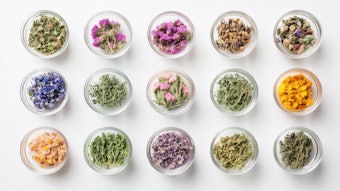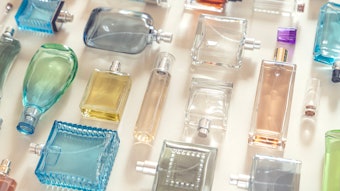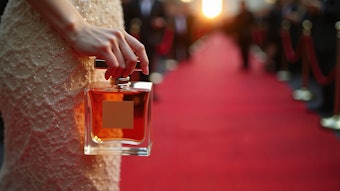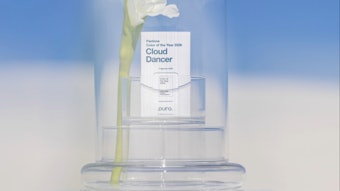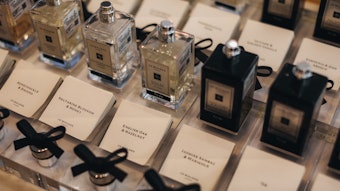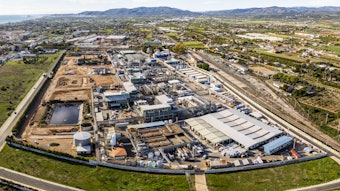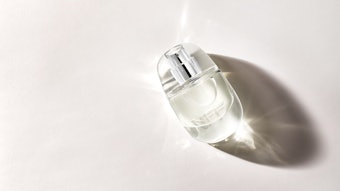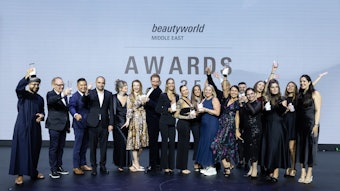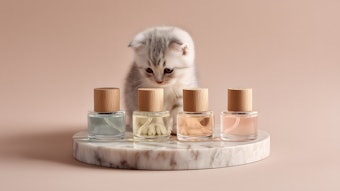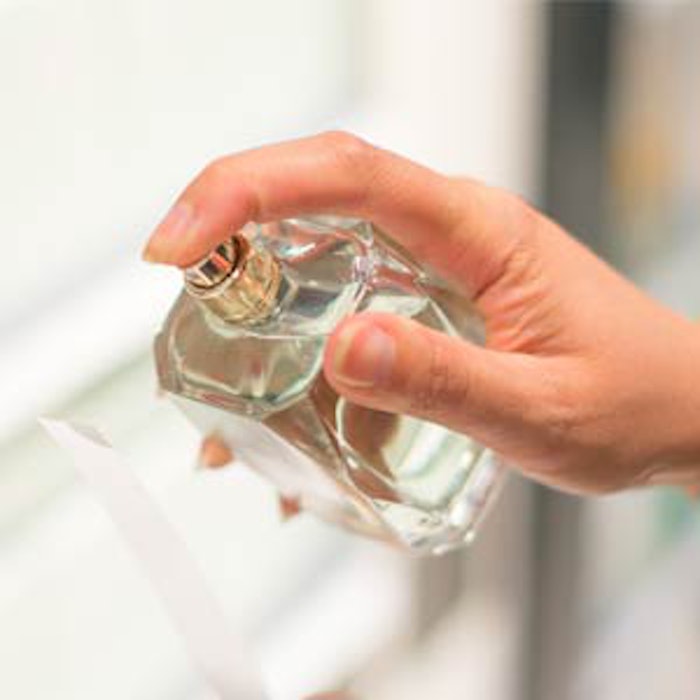
By Pia Long
What is a fragrance evaluator?
When consumers think of perfumers, the first image is probably of a pretty bottle on a dressing table. The majority of perfumers actually create functional fragrances (scents that go into our everyday household products, toiletries and many more products besides).
Fine fragrance is an important part of the business, but functional fragrance represents a sizeable chunk of the fragrance industry’s profits and some of its toughest challenges. Fragrance materials can react with the base product and cause undesired effects, such as discoloration or curdling. This means fragrance houses not only have to produce a winning fragrance, but they also have to ensure that it is compatible with the client’s base product.
Fine fragrance is an important part of the business, but functional fragrance represents a sizeable chunk of the fragrance industry’s profits and some of its toughest challenges.
Each type of base product also has its own regulatory framework that the fragrance must comply with and the client may have extra requirements (they may request an allergen-free fragrance for a cosmetic product, for example). Fine fragrances aren’t immune from technical problems either and it is important to ensure that the scent is just what the client wanted and performs as one would expect, too.
These are some of the reasons why larger fragrance houses benefit from having an existing fragrance library with thousands of scents which can be used as a starting point when a brief comes in with a tight deadline.
Roger Duprey, UK’s first research perfumer whose career started 50 years ago at Bush Boake Allen says, “It’s been said that 20% of your time as a perfumer should be spent working on new ideas. But if you work in the major companies and you are a core supplier you know you will be briefed for the big brands, so to get ahead of the game you need to be 90% of the way there. By the time the brief comes in and you only have a couple of months to fit in all the creative work, stability tests, market research, regulatory and everything else, you stand a chance.”
Creating a safe, stable and winning new shampoo fragrance for a global brand in a matter of weeks is not an impossible task if you are prepared. Roger went on to work for Quest, later Givaudan and has seen how the best evaluators in the industry operate first-hand. “When I started doing perfumery in the late seventies, it was just about the start of evaluators coming along. They have become the dominant force in the remaining 35 years I’ve been in the industry,” he says.
“My picture of the evaluator’s role is like the wheel of a carriage,” he says, “the evaluator sits in the middle and spokes go out to the various people who make up the team.”
“When I started doing perfumery in the late seventies, it was just about the start of evaluators coming along. They have become the dominant force in the remaining 35 years I’ve been in the industry.” - Roger Duprey
Ultimately the direction comes from sales, but evaluators connect to and work with sales, marketing, applications and regulatory departments – Roger’s image of the wheel corresponds to their role being central to project managing the process.
Teaming Up
Perfumers sometimes talk about smelling through naïve noses, and while consumer panels and focus groups can offer this, teaming up with other professional smellers who aren’t perfumers is a great aid.
“Expert noses have a trained brain behind them; amateur noses do not,” says Avery Gilbert, sensory psychologist and author of What the Nose Knows. “The expert readily perceives small differences in scent, and can correctly pin them to specific ingredients. The expert nose/brain has a lot more experience in making these judgments, and is thus more confident and agile. It reminds me of young championship poker players who have played thousands of hands online before even sitting down at a tournament table.”
Perfumers truly appreciate the help a good evaluator can offer. Penny Williams, creative perfumer and managing director at Orchadia Solutions says, “Sometimes when creating or modifying a perfume, you get so close to the scent that you know your own judgement is compromised.”
“You don’t necessarily know if you’re being too harsh on the perfume, or too forgiving. When working with a good evaluator, you trust their judgement and they can almost become an extension of your own nose. The perfumer can make better fragrances and also be more confident about when to stop,” she adds.
Due to the fast-paced nature of the world we live in today, fragrance houses have to respond to demand and it makes good business sense to do so. What that means for the logistics of managing thousands of fragrances in the library, being able to pinpoint exactly the right one to select or modify for a customer – or to make a decision about when to assign a completely new project for the perfumer – demands teamwork and evaluators have become increasingly important.
P&F Exclusive: Evaluators tell their stories
Paulina Plowman
Paulina Plowman, who spent 15 years as an evaluator at Robertet UK and now works for Azelis UK, explains how her fragrance career started:
“When I first came over from Poland I was applying for anything and everything – had I stayed back home, I would have become an English teacher but there obviously wasn’t much use for that in England! When I saw a vacancy advertised at Robertet, I thought – why not? Fragrances sound interesting, so let’s give it a go.
I was given a smelling test and a maths test and got the job. I spent my first year in the fragrance lab being a perfumer’s assistant and compounding their formulations. I had to learn quite quickly because the perfumer was going on holiday only a couple of weeks after I started, and there were hundreds of materials on the shelves; probably close to a thousand.
After my first year I realized that lab work probably wasn’t quite my career path and I’d rather work in an office. So I did some courses in my own time to learn computer skills (twenty years ago they weren’t as common as they are now!) and had a stroke of luck because the evaluation department at Robertet was expanding and I successfully applied for a job there. I was trained by the senior evaluator and also did the IFEAT Diploma in Aroma Trades Studies.”
Virginie Daniau
Virginie Daniau has been running her own consultancy Parfum Parfait since 2009, and entered the fragrance industry in 1997. “In a way I got into the industry by accident, but not totally. My diploma was in chemistry, but I had also always been creative and realized that I wouldn’t be able to spend my whole life in a lab as an organic chemist.
Luck did strike one day when I was walking down a corridor at the École Normale Supérieure. There was a lady one year ahead of me in the university and she had found a student placement with Quest in the UK, but it had been turned down by the gentleman who was responsible for assigning student placements because he thought it was not advanced enough for a third year chemistry student.
I learned about the different technical constraints of the different base products, and about regional scent preferences during my training.
So this poor girl came out to the corridor from the office where she had just learned the bad news and told me that her teacher had said if a second year student wants to take the placement, they can. And she gave the papers to me instead.
It took a couple of years of training in both France and the UK across multiple categories. I decided to work in the antiperspirant/deodorant category for Unilever and also learned about shower gels, soaps and so on. I learned about the different technical constraints of the different base products, and about regional scent preferences during my training so by the time I got to my final product category, I was able to draw on an enormous amount of data.”
Rebecca Mulcahy
Rebecca Mulcahy works as a fragrance evaluator at Seven Scent. She originally studied forensic science at university.
“In my third year at uni, I did a year in the industry and there was only one forensic placement at the home office and I didn’t get that. So I went to Unilever for a year and did formulation for deodorants and antiperspirants — and it’s that experience which opened the door for me at Seven and got me an interview.
I started in the lab, compounding for the perfumers. Then we moved to a new site and I helped set up the new lab. When I first started, I had the opportunity to shadow our only evaluator at the time and just sort of followed her around and asked to smell things with her and it grew from there. We were nowhere nearly as busy then as we are now, so I realize that was a bit of a luxury!”
A Day in the Life of an Evaluator
Paulina
You meet up with the team of perfumers, and discuss the projects that have come in and how you will approach them. Then, depending on the nature of the projects, the evaluators select appropriate fragrances for the perfumers to work on, or in some cases the perfumers begin work on something completely new. It is the job of the evaluator to be aware of what is in the library and to select the correct fragrances to start work from.
You have to be aware of what is on the market; what fragrances are in fashion and what is likely to trickle down from fine fragrance to other categories. You also have to know which fragrances perform better in what kind of product — so you work very closely with the perfumer on that side of things, too.
You have to be aware of what is on the market; what fragrances are in fashion and what is likely to trickle down from fine fragrance to other categories.
Vocabulary and communication skills are very important because fragrance is so subjective. What one person describes as fresh and green might not be how you think of those smells at all. So you have to be very clear about what people really mean. Sometimes it is easier to ask customers to give examples of products they like so that you know you are talking about the same thing.
Rebecca
I come in and look at the project list and whether we have any active briefs on, check any new ones, check that we've got all the information we need - and usually we'll go to the library to start with, since we've got over 4,000 fragrances there at the moment. So, let’s say we need a fruity-floral detergent powder: we'd search by those features, application, fragrance family and price. And we’ll dip the top ten matches from the library and might get some of them put into the appropriate base and evaluate them in the jar and in water.
Sometimes one of the fragrances might just fit the brief perfectly, but most of the time we'll come back to it and task the perfumers. Once you have briefed the perfumers on the projects, you usually smell work from the previous day with them and decide what sort of further work might be necessary.
Before submitting a fragrance to a customer, we’ll evaluate the smell in its base product and then – depending on what the product is – in water, skin, and so on.
We also panel test fragrances and keep going back to the client brief and their original moodboard during that sort of feedback, just to make sure we are heading in the right direction. And communication between all parties is very important – if a customer in Nigeria asks for fruity, they don’t mean what we mean by that.
The Drydown
Creating fragrances for consumer products is exciting and rewarding but due to the nature of how these products are brought to market many of the careers in the fragrance industry remain hidden. The level of expertise and artistry that goes on behind the scenes is worth celebrating and evaluators are an invaluable – even central - part of the team.
Interested in a career in fragrance? Check out P&F’s career board.
Route to Career
What does a fragrance evaluator do? Evaluators work with perfumers, sales, marketing and laboratory teams to make sure that the right fragrances are selected and created for customers.
The job involves keeping up-to-date with fragrance trends and being able to effectively communicate about smells. Sometimes evaluators also conduct consumer panels and focus groups. They usually manage the internal fragrance library and may be assigned to a specific product category or to just one customer.
Smelling with perfumers and being able to offer useful, objective feedback about the technical aspects and overall impression of the fragrance are at the heart of the job. Good evaluators form strong teams with the perfumers they work with and perfumers appreciate the objectivity and organization that evaluators bring to fragrance creation.
The path usually starts with a junior evaluator role and initial training takes one to two years.
Skills and qualities of a good evaluator:
• Passionate about fragrance
• Excellent interpersonal skills
• Confident communicator
• Balanced judgement
• Diligence; attention to detail
• Project management
• Ability to make sense of vast amounts of data and interpret it for others
• Highly organized
• Experience of the consumer fragrance market; knowledge of trends and product categories
Read more in this month’s issue
The May issue of Perfumer & Flavorist features “Fragrance Evaluation for Niche Brands – Passion Above All," which takes a detailed look at the unique relationships between niche brands, fragrance houses and the evaluators who work with them. The magazine features exclusive interviews and insights about fragrance evaluation for independent and niche brands.
